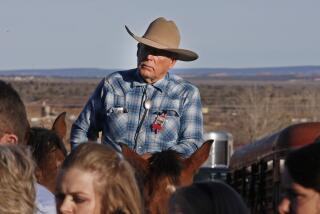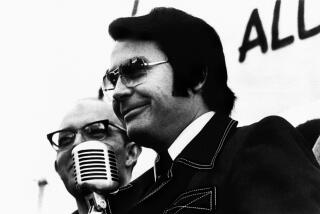Porno Foe Has Unusual Ally in Killer Bundy : Religious Broadcaster Tapes Interview Before Execution
- Share via
Pomona-based religious broadcaster James C. Dobson, whose half-hour “Focus on the Family” program is heard daily on 1,300 radio stations, found an unusual ally this week in his crusade against pornography: mass killer Ted Bundy.
In a videotaped interview Monday, just hours before he was electrocuted Tuesday morning in a Starke, Fla., prison, Bundy told Dobson that “hard-core pornography” was “the fuel for his fantasies” and led eventually to Bundy’s violent sexual crimes.
Member of Commission on Pornography
Dobson, a vocal member of former Atty. Gen. Edwin Meese’s federal Commission on Pornography, released videotaped excerpts of the interview Tuesday. A spokesman for Dobson’s ministry said there has been no decision on whether to broadcast the Bundy interview, the only public comments the well-publicized killer made in the days before his execution.
Handcuffed and sitting at a table across from Dobson in the interview, Bundy, 42, reportedly a confessed killer of 30 young women in nine states, alternately smiled and sobbed, but concluded, “I deserve the most extreme punishment society has,” according to excerpts from the interview released to the media.
He said it was “important to me that I’m not blaming pornography. . . . I take full responsibility.” But he said hard-core pornography “guided and shaped” what he did.
As a boy of 12 or 13, Bundy said, he began reading violent, hard-core pornography and detective magazines he found in garbage cans. But after a time, Bundy said that no longer satisfied him, and he wondered what it would be like to carry out his urges.
‘Obviously One of Them’
When Bundy noted that there are people who do not commit crimes after being aroused by pornography, Dobson asserted in the interview that “there is a percentage of people affected by hard-core pornography in a very violent way, and you are obviously one of them.”
The Meese anti-pornography commission declared in 1986 that links exist between sexually violent materials and “anti-social acts of sexual violence”--contrary to a 1970 presidential commission study on pornography that declared such evidence was lacking.
Dobson was not available for comment Tuesday, but Paul Hetrick, a vice president of the Focus on the Family ministry, said the Pomona broadcaster has been exchanging letters with the murderer since 1987. Dobson went to Florida to see Bundy at the prisoner’s request, according to Hetrick.
Bundy made the request for the last-minute visit through John Tanner, who was recently elected a prosecutor in Daytona Beach but who previously counseled Bundy through a religious prison ministry, Hetrick said.
Dobson holds a doctorate from USC and was a clinical professor of pediatrics at USC’s School of Medicine when he wrote “Dare to Discipline” in 1970, a book that has since sold 2 million copies. Answering mounting requests from churches for his advice on family matters, Dobson began his own ministry out of an office in Arcadia.
Layman in Church of the Nazarene
A layman in the Church of the Nazarene, Dobson has become one of the most influential non-clergy in conservative Christian circles. He was one of the leaders of the nationwide protest last summer against Universal Pictures’ motion picture “The Last Temptation of Christ.” He is scheduled to give the opening plenary address for the National Religious Broadcasters annual convention Saturday night in Washington.
Dobson’s $12.2-million headquarters building receives 150,000 pieces of mail monthly. Dobson replied to a letter from Bundy in 1987 and later answered another “three or four letters,” Hetrick said. Saying it is against the policy of the ministry to reveal the contents of such letters, Hetrick added that he did not know if Bundy heard of Dobson through the ministry’s radio programs or from one of their publications.
Dobson had a two-hour, unrecorded interview with Bundy on Sunday and the videotaped interview Monday. The decision was made to videotape the second interview in case Bundy “revealed details about criminal cases yet unsolved,” Hetrick said. “It seemed important to record everything . . . his facial expressions . . . which law-enforcement authorities could conceivably use to help resolve some of these cases.”
More to Read
Sign up for Essential California
The most important California stories and recommendations in your inbox every morning.
You may occasionally receive promotional content from the Los Angeles Times.












